Dementia Treatment
Board-Certified psychiatrist specializing in dementia offers immediate help, including dementia medication and treatment. Contact +1(833)312-4222 for assistance.


Cognitive decline and dementia can dampen a person’s retirement and twilight years to various degrees. Most people experience a mild cognitive decline such as memory loss and experience difficulty solving puzzles, this should not be a cause for concern.
The majority of people over seventy years of age have some mild microvascular disease which is completely normal. This should not prevent them from leading an active life and maintaining their independence.
It is advisable to seek treatment if the cognitive decline is rapid or more severe, noticeable to others, and interferes with daily functions, or decision-making.
The term dementia means:
‘Progressive cognitive decline for more than three months.’
Some forms of dementia are severe and progressive, such as Alzheimer’s; however, other extreme forms of Dementia also exist. It is important not to panic if your loved one is presenting symptoms of dementia, as most causes of dementia are treatable, progress slowly, or are even reversible.
A common reversible cause of dementia in the elderly is ‘pseudodementia’, which is caused by depression and serotonin imbalance. This form of dementia responds very well to SSRI and medication may lead to rapid improvement in symptoms. Other conditions that can mimic dementia include anxiety, nutritional deficiencies, and chronic sleep deprivation.
Secondary to depression, which can look just like Alzheimer’s, B12 deficiency, hypothyroidism, or sleep apnea. Certain medications, especially sleep medications can cause delirium and confusion.
Sometimes, the fear of cognitive decline and anxiety about testing can be worse than the memory loss itself. It is important for anyone experiencing dementia-like symptoms, such as memory loss or any form of cognitive decline to schedule an evaluation.
Reasons for a Dementia Evaluation
- To establish if a person does have dementia.
- To establish the underlying cause of dementia or cognitive decline.
- To treat any reversible causes of dementia or memory loss.
- To treat any conditions that mimic dementia or cognitive decline.
- To initiate treatment and slow the progression of any irreversible causes of dementia.
- To provide support to patients and families with a more serious dementia diagnosis.
- To assist with paperwork for initiation of services such as home help.
- To assist with long-term planning.
Retirement should be the best time of one’s life, free from the obligations of work and raising a family, and the time when people are free to pursue their hobbies, interests, and personal and spiritual goals.
Although most forms of cognitive decline are either mild or treatable, a more serious diagnosis such as Alzheimer’s can be frightening or overwhelming, and support is needed for both patients and families.
If there is a suspicion of Alzheimer’s then it is essential to get an evaluation and get access to treatments and access services. Microvascular dementia is another form of progressive dementia, which needs to be evaluated as treatment can slow progression and prevent complications of microvascular disease such as stroke.
Dementia Specialists
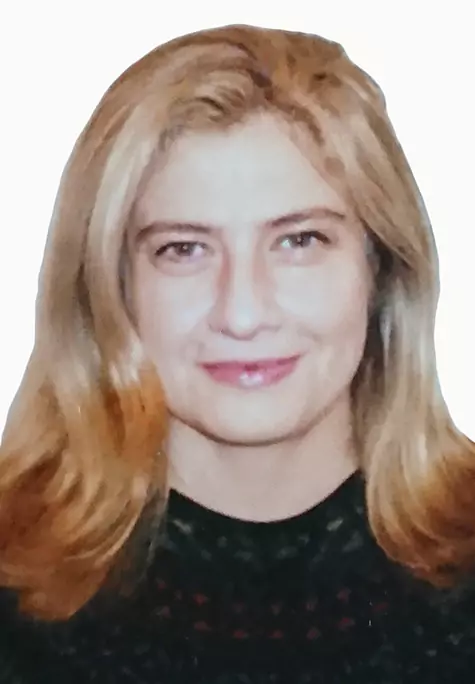
Dr. Valeria Serban
Dementia Specialist with Multiple State Licenses MBBS (MD)
Dr. Valeria Serban is a highly experienced board-certified neuropsychiatrist with more than twenty years of experience in treating a wide range of neuropsychiatric conditions. She treats psychiatric illnesses associated with neurological conditions such as dementia, postpartum depression, migraine, epilepsy, concussion, stroke, Parkinson’s disease, multiple sclerosis, sleep disorders such as narcolepsy, and other age-related neurological disorders.
Dr. Serban has a kind and compassionate approach to patient care. She explores different treatment options and works collaboratively with her patients to find one that best suits them. She is knowledgeable and confident, treating all patients with utmost urgency and care for the best results.
Many forms of dementia are curable; the progression of some can be slowed down with medication, support, and therapy. Dr. Serban’s neurology background is especially helpful for the diagnosis and treatment of dementia. Treatment would aim to manage the symptoms of dementia using medication and provide support through therapy to ease the feelings of anxiety and frustration.
She treats other psychiatric illnesses such as postpartum depression, psychosis, social phobia, bipolar disorder, dementia, obsessive-compulsive disorder (OCD), depression, panic disorder, mood disorder, and other medical conditions resulting in psychiatric symptoms.
To elevate patients’ quality of life, she offers customized treatment plans based on hormonal, nutritional, and medical health evaluations. Dr. Serban believes proper support, good therapy, and medications can greatly improve many psychiatric symptoms.
Medical School
Neurology Residency Training
Master of Philosophy (M.Ph.) - Neuroscience
Internal Medicine Residency
Neurology Residency
Doctor of Philosophy (Ph.D.) - Neuroscience
Clinical Neurophysiology Fellowship
Board Certification

Dr. Tony Issac
Board Certified Psychiatrist in New York & New Jersey (MD)
Dr Tony Isaac is a double-certified addiction and general psychiatrist conducting compassionate, discreet psychiatric evaluations and providing psychiatric care services, which include medication management and psychotherapy.
Having over nine years of work experience, Dr. Isaac considers various medical factors before chalking out a comprehensive and customized treatment plan to provide the best psychiatric care and treatment to each patient.
Dr. Issac provides help treating a wide range of psychiatric conditions, including dementia, insomnia, panic attacks, depression, anxiety, OCD, bipolar disorder, and schizophrenia. He conducts suicide assessments and acute stabilization and works with your family and employer to provide you with the required care and support.
Dr. Issac evaluates, diagnoses, and treats people based on their nutritional and hormonal health and medical pathology. He is known among his patients to be very warm, polite, and compassionate, easy to get along with.

Dr. Gundu Reddy
Board Certified Psychiatrist with Multiple State Licenses MBBS (MD)
Dr. Gundu Reddy is a board-certified Psychiatrist with fifteen years of experience practicing clinical psychiatry. She also has ten years of experience practicing forensic psychiatry. Dr. Reddy has trained in medication management, psychodynamic psychotherapy, and cognitive behavioral therapy.
She diagnoses and treats a variety of psychiatric illnesses such as dementia, insomnia, panic attacks, depression, anxiety, OCD, bipolar disorder, and schizophrenia.
Dr. Reddy has a special interest in integrative psychiatry and believes that multiple factors should be considered when evaluating and treating a patient. That includes genetic and developmental factors, medical illness, nutrition, hormones, as well as environmental and dynamic factors.
Schedule an Appointment with one of our Online Psychiatrists.
Clinical Services: California, Florida, Illinois, New Jersey, New York, South Carolina, Tennessee

Forensic Psychiatry Services: All of the US and Canada
How much does it cost to see an online psychiatrist at Gaba Telepsychiatry?
Your first online appointment with one of our psychiatrists will cost $400. The follow-up appointments will be $250. If you have out-of-network benefits, we can submit claims on your behalf.
What is dementia ?
Dementia is a broad term used to classify any form of progressive cognitive decline lasting more than three months.
Although many people understand dementia to mean Alzheimer’s disease, most forms of dementia are either less severe or treatable and do not mean Alzheimer’s disease.
What are the symptoms of dementia?
The symptoms of dementia often depend on the underlying cause but can often be categorized into mild and severe symptoms.
Early & Mild Symptoms of Dementia
In its early stages, dementia symptoms are mild and mostly unnoticeable. The person may experience some memory loss, they may have difficulty completing puzzles, but not to a very obvious extent; there is no immediate impact on their daily lives.
Severe Symptoms of Dementia
Symptoms of severe dementia include a steady decline in cognitive abilities such as memory problems, poor decision-making skills, language issues, erratic thoughts, and emotional control.
A person must suffer from dementia symptoms for more than three months for an adequate diagnosis.

Types of dementia
Reversible causes of dementia or cognitive decline
These conditions have symptoms of dementia but occur due to underlying medical conditions that result in dementia-like symptoms. With the correct evaluations, diagnosis, and medications, the symptoms of reversible dementia can be eased and cured. One of our psychiatrists can evaluate, diagnose, and treat the underlying causes of your condition. The main causes of reversible dementia are
Vitamin deficiencies:
Vitamin deficiencies can mimic the symptoms of dementia. The most common deficiencies that cause cognitive impairment are vitamin B12, D3, and folate.
Low vitamin D3 levels are associated with both dementia and strokes. Blood folate deficiencies are common with age. Studies found that low serum folate levels are associated with poor neural signaling and an increased risk of dementia.
Metabolic diseases or abnormalities:
The brain’s structural and functional changes from many years before the onset of dementia symptoms. High blood pressure, high blood glucose levels, abdominal obesity, hypothyroidism, hypoparathyroidism, and dyslipidemia (having blood lipid levels that are too high or low) can cause dementia-like symptoms.
Drug effects and interactions:
Many drug interactions in older individuals can display symptoms of dementia. The most common medications with adverse drug interactions are anti-depressants, antiplatelets, anti-psychotics, antihistamines, and omeprazole. Benzodiazepines, antihypertensives, and drugs with anticholinergic properties can also induce dementia-like symptoms. They may result in several neuropsychological deficits.
Depression:
Pseudodemntia is a term used to describe intellectual decline stemming from the lack of energy or effort. A decline in cognition is swift in the case of depression; far more so than Alzheimer’s or other forms of the condition.
Excessive alcohol consumption:
The alcohol metabolite acetaldehyde was shown to be a direct neurotoxic. Chronic alcohol-induced dementia symptoms can result in memory problems, executive dysfunction, and poor spatial awareness of an individual.
Stress:
Chronic stress releases cortisol, the stress hormone, which can affect memory. Struggling with stress for long periods can result in compromised immunity.
Inflammation:
Inflammation is an immune response to an injury, pathogens, oxidative stress, and toxins. Persistent chronic inflammation has been linked with increased chances of dementia.
Lung Problems:
Lung problems can result in a shortage of oxygen supply to the brain. Patients suffering from conditions such as COPD or chronic obstructive pulmonary disorder have a higher risk of experiencing dementia symptoms, than the rest of the population.
Sleep issues:
Sleep problems, such as undiagnosed sleep apnea can damage the brain significantly. However, this damage is reversible with a correct diagnosis. Studies revealed that patients suffering from sleep apnea brain damage showed significant improvement after using the CPAP machine for three months or more.
Systemic Lupus:
An autoimmune disorder, Systemic Lupus Erythematosus (SLE) can affect genetic, and epigenetic factors (environmental aspects that affect a person’s behaviors, without impacting the genes). It can also affect hormones and the immune system. The damage to the body can be unpredictable. Many organs, including the brain, may be affected causing neuropsychiatric symptoms.
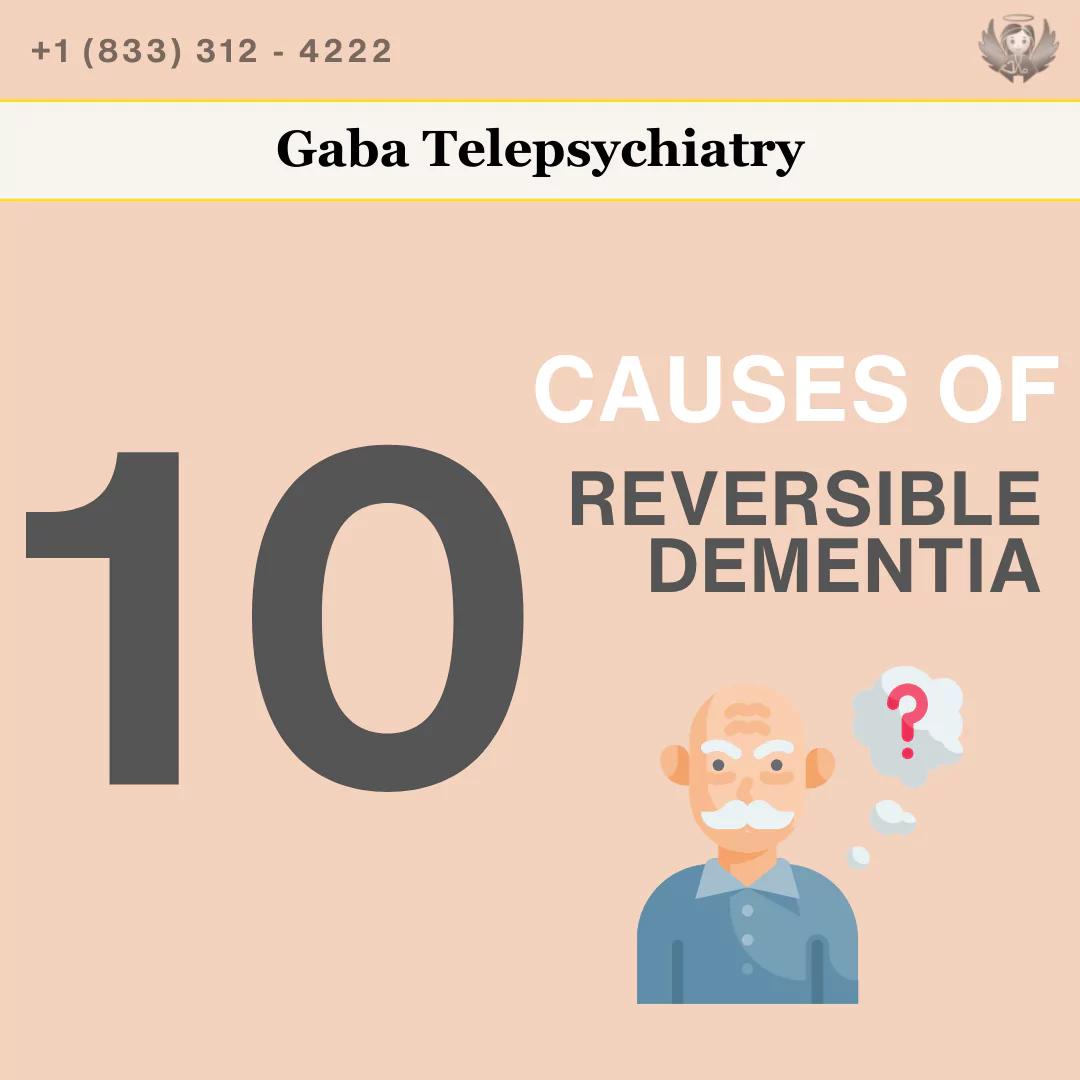
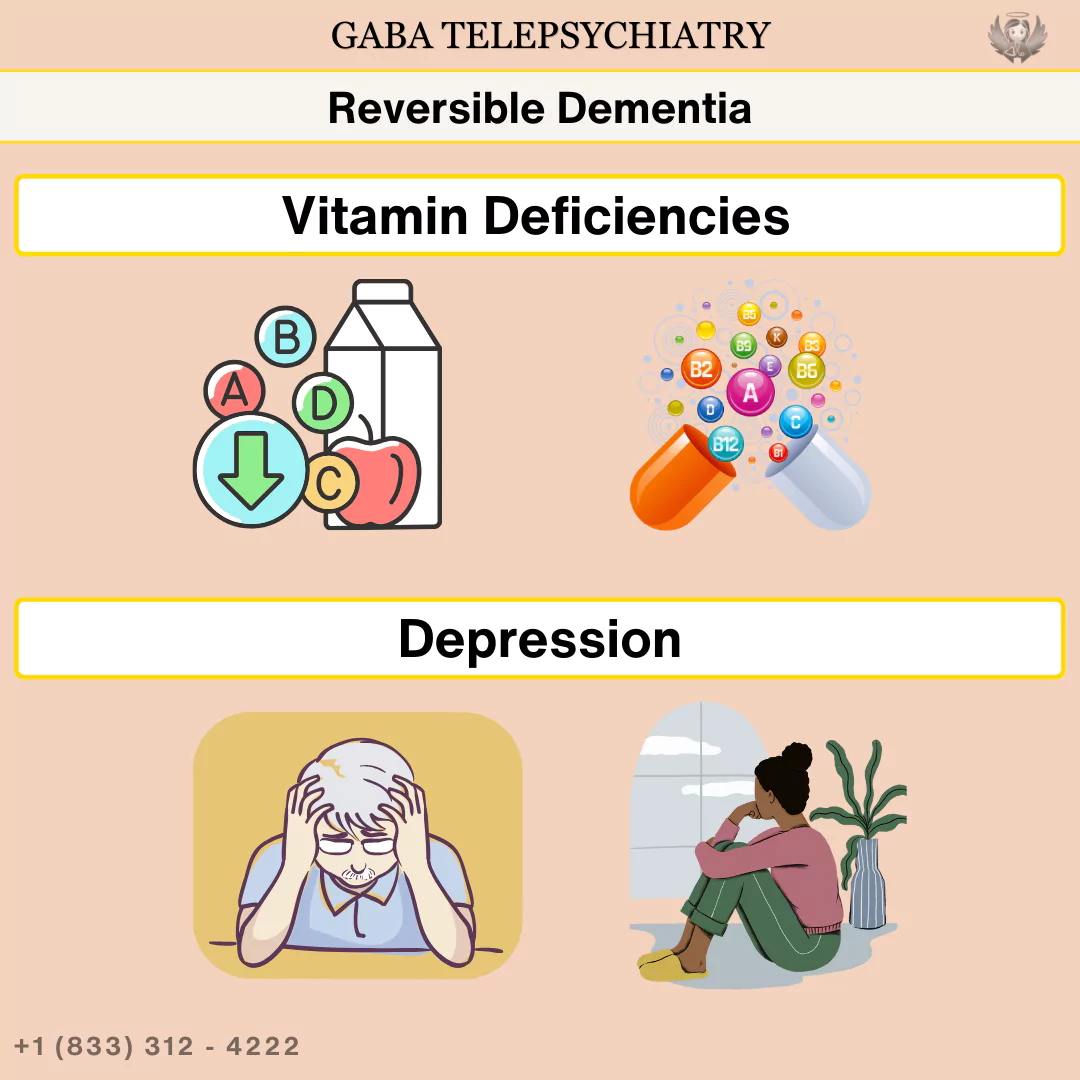
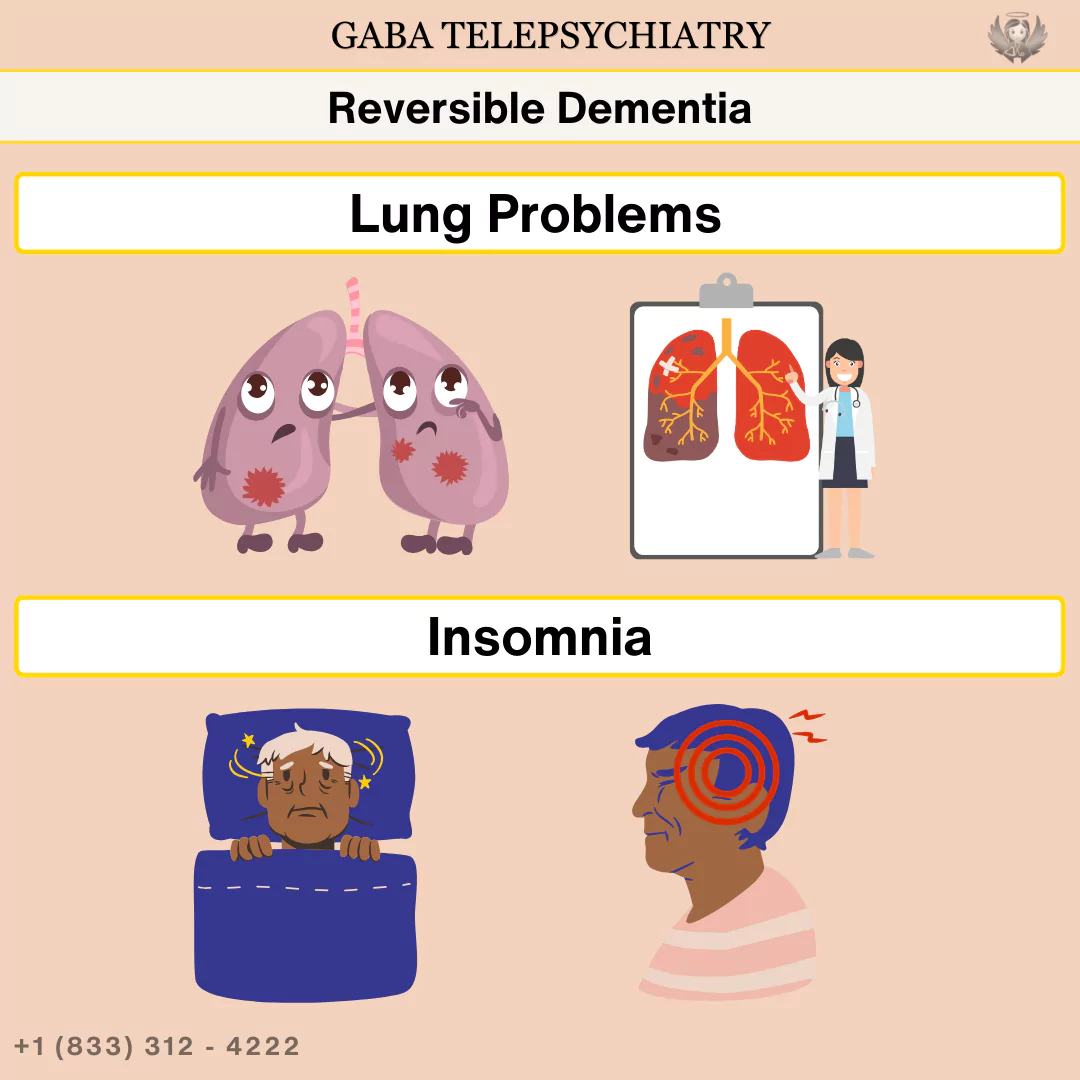
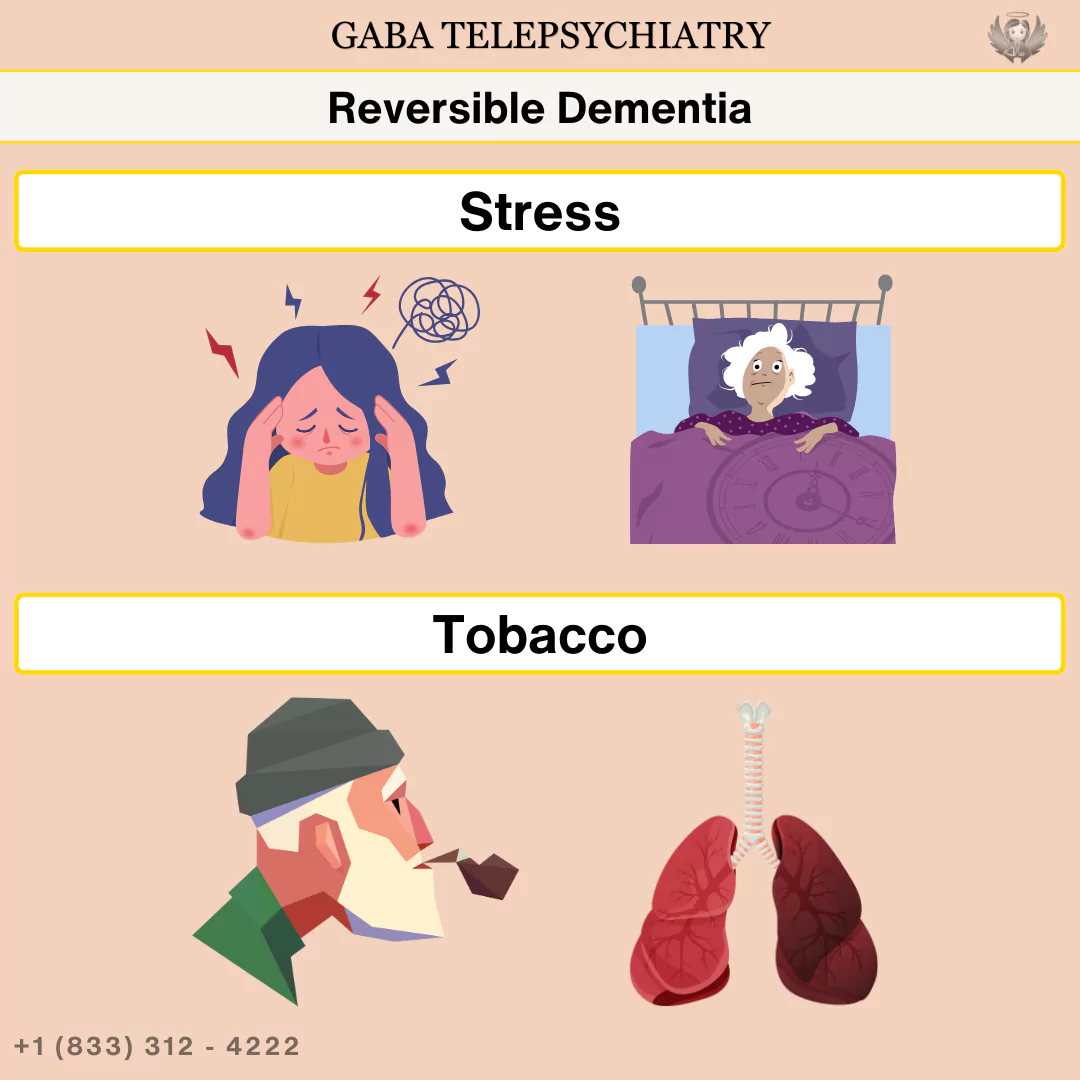
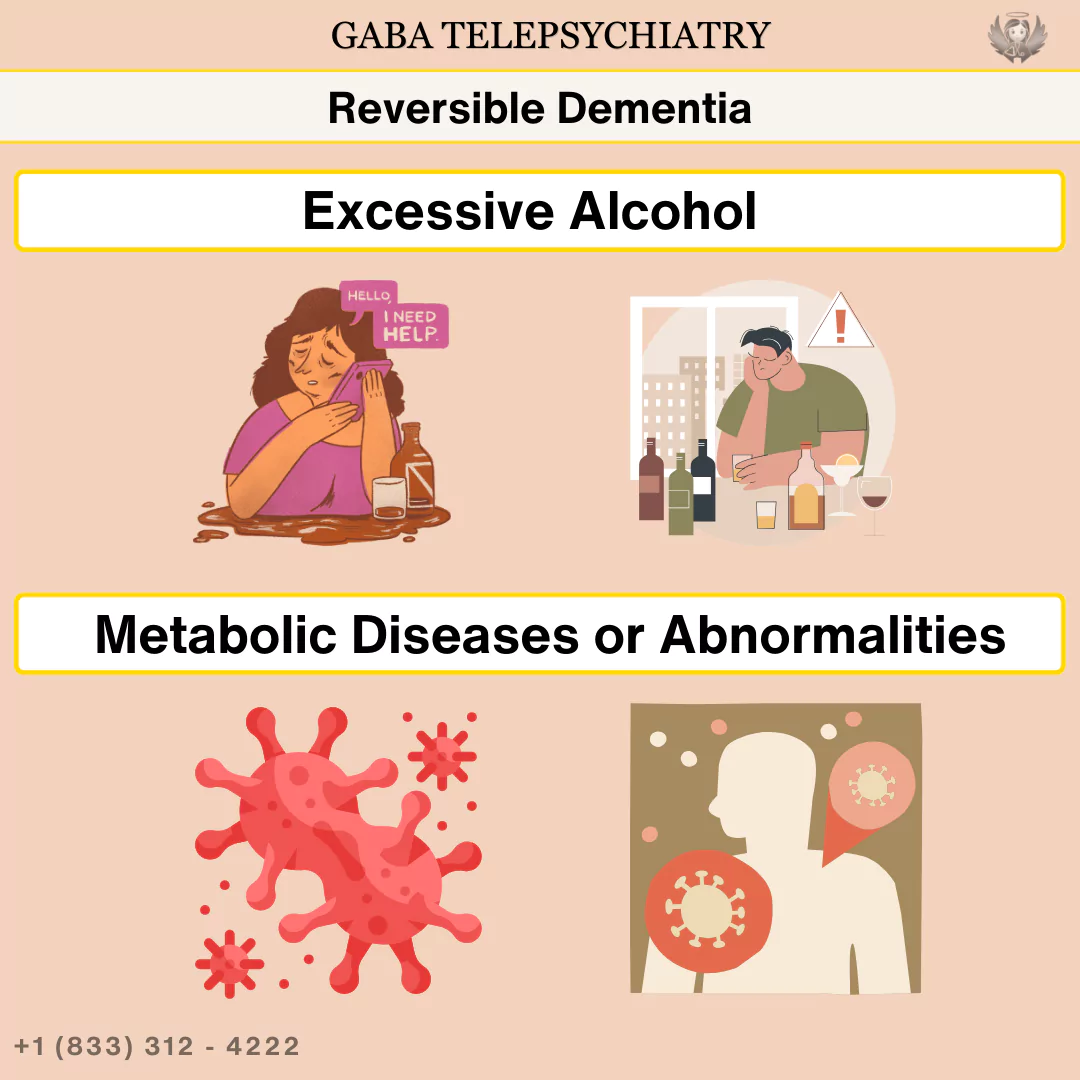
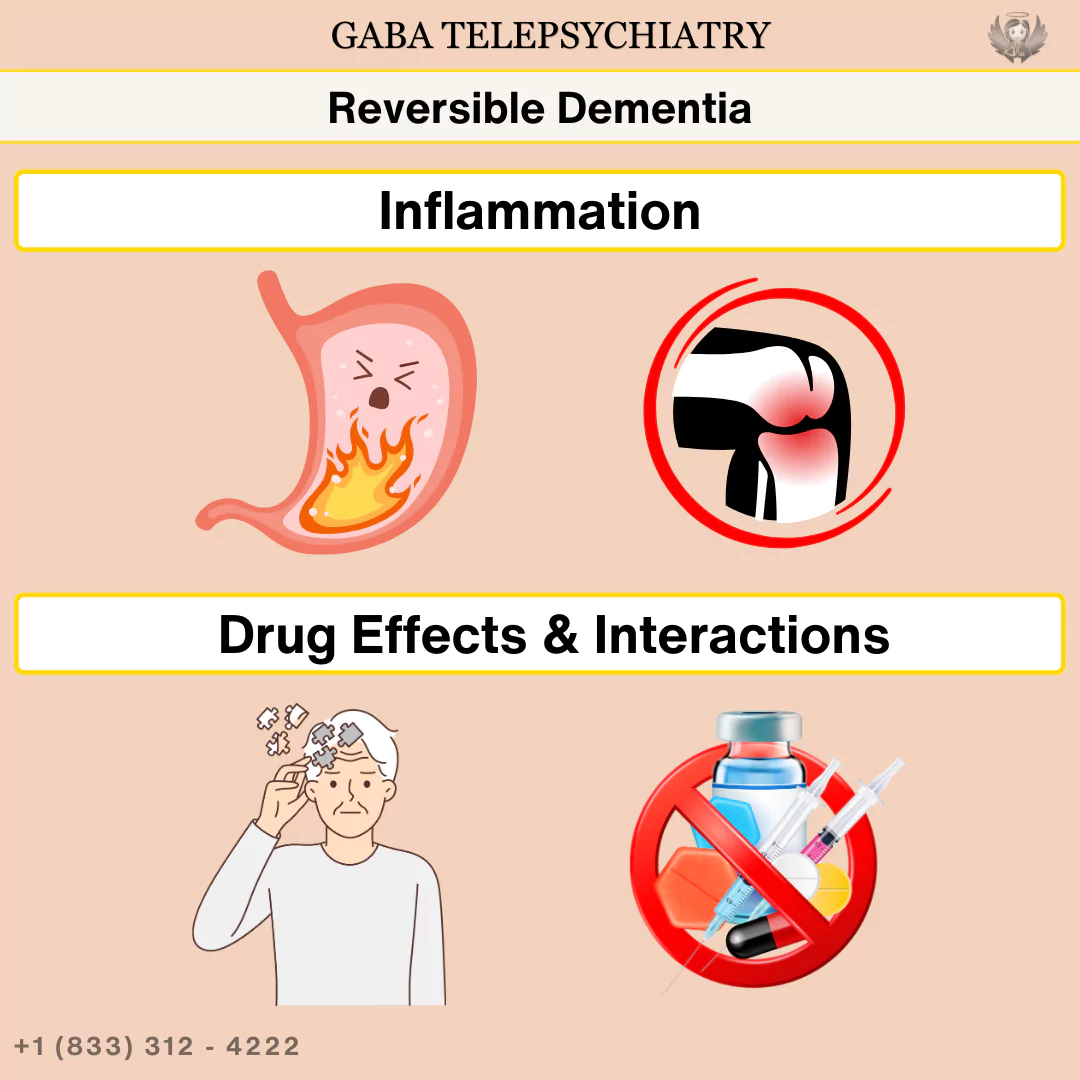
Your psychiatrist will assess your diet for any nutritional deficiencies. They will also consider the endocrine functions measured by your hormone levels, and discuss your medical history along with the symptoms.
For a dementia evaluation, the person close to the patient is asked questions about their behaviors and patterns for the right diagnosis. Without proper feedback about the person’s daily routines and how the symptoms may have hampered their lifestyle, it is hard to ascertain the degree of impairment.
Reversible dementia is treatable and you can recover completely from it with a correct diagnosis. Early intervention can lead to many happy and active years.
Irreversible Dementia
Irreversible dementia happens due to unusual brain activity because of injured brains. Such conditions are irreversible, but with a correct diagnosis and medications, the progress of the conditions may be slowed. The following are the forms of irreversible dementia.
- Alzheimer’s disease
- Vascular dementia
- Lewy Body dementia
- Frontotemporal dementia
Alzheimer’s Disease
Alzheimer’s disease is possibly the best-known example of the condition. Nearly 60% to 80% of cases of dementia are Alzheimer’s disease. That is nearly one in nine Americans suffering from the disease above the age of 65 years. It is progressive and a combination of medications can help slow down the severity of the symptoms and progression.
Ongoing research has shown improvements in treatments, slowing the degeneration of the nerves with medications. Alzheimer’s disease takes many years to progress. However, the cognitive decline of the disease, despite controlling the amyloid buildup continues in many cases.
If you or a family member is suffering from memory problems, confusion, or compromised cognitive abilities, then it is advisable to reach out for support. No one should suffer alone and silently.
One of our board-certified psychiatrists will consider your lifestyle (activity/stress levels), medical history, symptoms, and other psychodynamic factors to diagnose and treat your symptoms. With the right support and medication, you can control the severity of the symptoms.


Vascular dementia
Vascular dementia is the second most common type of condition to affects millions worldwide. In the US, it accounts for up to 40% of dementia among elderly people. It occurs during a stroke or a few series of strokes.
Cardiovascular and cerebrovascular diseases are the main causes of vascular dementia. The restricted blood flow to the brain during a stroke causes irreversible brain damage, by starving brain cells of essential nutrients and oxygen. The brain’s cortex is affected, which controls memory, learning, and language.
Sometimes, the damage from the initial few strokes may be negligible, however, it may add up over time. It can lead to confusion, memory problems, trouble speaking or articulating, and other symptoms of dementia.
Transient Ischemic Attacks (TIA)
Transient ischemic strokes rupture and damage blood vessels; it injures the brain irreversibly. Fortunately, with medication and lifestyle changes, the chances of more strokes can be reduced.
TIA are typically less noticeable and milder strokes. Their effects can last roughly an hour before disappearing. TIA can occur without incident, where others and sometimes, even the person suffering are not aware of it. Frequent TIA damage can add up and result in a more severe stroke that brings the onset of VaD.
Atrial Fibrillation (Afib)
Erratic and irregular heartbeats result in atrial fibrillation. When the heart is pumping blood irregularly, there are higher chances of blood pooling, which can lead to severe strokes. Such strokes cause permanent injury to the brain. Cardioversion, which is when electric pulses are used to decrease heart rate is a common treatment, apart from medications and blood thinners.
The severity of the strokes usually determines the onset of the condition. A severe stroke can cause a lot of damage to the brain; in such cases, the onset of dementia may be sudden and immediate. Others may experience a gradual decline in their cognitive abilities, as they may suffer from several less severe strokes that are spread out over some time.
Support and therapy with the right medications can help ease the symptoms. Lifestyle changes and treating cardiovascular problems can improve symptoms and lead to many active years.
With the right diagnosis, treatment, and medication, you can lead a fulfilling and rewarding life. Reach out for treatment and support.
Lewy Body Dementia
Lewy Body dementia (LBD) is a rarer form of dementia affecting between 5% to 10% of cases, globally. Protein deposits known as Lewy bodies (alpha-synuclein), accumulating in the brain in microscopic quantities cause the condition. These deposits interfere with normal brain function causing a noticeable decline in the person’s cognitive abilities.
Variations
Lewy Body dementia takes on two forms, both with different initial symptoms. For instance, LBD starts with memory loss, as in Alzheimer’s disease; it may however, later develop into movement, sleep, behavior, and cognitive issues, such as hallucinations.
Parkinson’s disease dementia is the other form of Lewy Body dementia; it may seem like a movement disorder in its initial stages, only to be followed by the onset of dementia symptoms.
Both forms of Lewy Body dementia experience a similar spectrum of issues.
- Tremors
- Visual hallucinations
- Varying degrees of inattention and alertness
- Shuffling gait
- Sleep disorders
Although Lewy body dementia may seem like an Alzheimer’s disease or a Parkinson’s disease diagnosis, the treatment options vary. The early symptoms of the condition determine the treatment options, making an early diagnosis crucial for managing the condition.
A psychiatrist can diagnose and help manage the symptoms of the condition; people can live happier and more independent lives with proper medications and management. There is no cure for Lew Body dementia, but a diagnosis can help with customized treatment plans.
No one should suffer alone. If you or your loved ones are suffering from memory loss, confusion, and other psychiatric symptoms, then it is advisable to get a thorough evaluation for the correct diagnosis.


Frontotemporal dementia
Frontotemporal disorders (FTD) occur when there is damage to the frontal and temporal lobes of the brain. Depending on which part of the brain is affected, symptoms vary between patients and encompass a wide range of unusual behaviors. Communication problems, poor emotional regulation, trouble with movements, and difficulty with work can all be symptoms of the disorder.
FTD affects people at a younger age; approximately 60% of people with FTDs are 45 years to 64 years of age. FTD is progressive, meaning symptoms deteriorate over time. It may start with a single symptom, which determines the treatment options.
The frontal lobe is responsible for
- Social skills
- Movement
- Reasoning and judgment
- Verbal communication
- Understanding what is right or wrong
- Self-control/inhibitions
Temporal lobes handle
- Memory
- Hearing
- Understanding verbal communication
- Emotional expression and processing
FTD usually affects any combination of these sections of the brain. As the condition develops, more segments of the brain are affected.
Behavioral variant frontotemporal dementia:
This is the most common form of FTD, also known as bvFTD. This form of the disorder affects judgment, behavior, and personality; however, although their cognition may be impaired, people can still have a reasonably well-functioning memory. Symptoms include
- Planning and sequencing trouble
- Problems with prioritizing work or activities
- Repetition of activities or words
- Saying or doing inappropriate things
- Disinterest in familiar and previously enjoyed activities
As the condition progresses, the person may develop communication and movement problems. Towards the later stages of the condition, the person will require supervision, assistance, and care.
Primary progressive aphasia:
PPA affects the language and communication center of the brain. Symptoms of aphasia include
- Trouble understanding and using words
- Speaking difficulties like slurred speech
Three types of PPA affect different aspects of language:
Semantic PPA: In this form, PPA affects the person’s ability to understand single words. The person may also have trouble recognizing familiar faces and common objects for daily use.
Agrammatic PPA: A person suffering from this form of FTD will progressively have more difficulty speaking. They will also omit articles and prepositions like (as, to, from, the, etc.) that link nouns and verbs. In the advanced stages, the person may become unable to speak and also develop symptoms of corticobasal syndrome.
Logopenic PPA: In this form, the person suffering can understand words and sentences, although they have trouble finding the right combination of words during a conversation. There are no problems with grammar in this form of the condition.
People with all forms of PPA may become mute or unable to speak over time. They may also develop other symptoms of dementia, such as issues with memory, reasoning, and judgment. These may not be obvious in the initial stages, but develop progressively.
Some people may also develop symptoms of bvFTD, with behavior and personality changes. The correlation of the different types of PPA to biological phenomena is yet to be established.
FTD includes two forms of rare movement disorders. People suffering from these disorders have the movement center of the brain affected. The conditions are corticobasal syndrome and progressive supranuclear palsy. The symptoms may also include language and thinking problems.
Corticobasal syndrome
This condition is caused by the degeneration of nerves; the nerves in specific parts of the brain shrink and die. It is caused by corticobasal degeneration. The disorder typically affects people around the age of 60 years; it causes the person to lose control over their movements.
Apraxia is the most common symptom of this condition. It refers to the inability to move arms or hands to perform small movements, like buttoning a shirt or operating small appliances. Muscle rigidity and trouble swallowing are also symptoms of the condition.
Occasionally, a person suffering from corticobasal syndrome will have trouble with orienting objects, and then develop language problems. However, many affected by this condition may not develop language, memory, cognitive, or behavioral difficulties.
Progressive supranuclear palsy
This condition causes many to experience body stiffness that affects their balance and gait. They may fall inexplicably, lose facial expressions, and particularly experience difficulty in looking down, as it affects eye movements in many. Symptoms like memory trouble, behavior problems, poor judgment, and issues with problem-solving may also develop with the progression of the condition.
Other FTD movement disorders include frontotemporal dementia with parkinsonism and frontotemporal dementia with amyotrophic lateral sclerosis (FTD-ALS).
Frontotemporal dementia with parkinsonism is usually a genetically inherited disease; it is caused by a tau genetic variant. It shares many of its symptoms with Parkinson’s disease, such as stiffness, balance issues, slow movements, and behavioral and language changes.
FTD with motor neuron disease or, FTD-ALS occurs due to a combination of bvFTD and ALS, Lou Gehrig’s disease. People suffering from this variant of FTD, not just experience the behavioral changes of bvFTD, but also progressive muscle weakness, twitches, and slight jerks, as is common in Lou Gehrig’s disease.
The first symptoms may manifest as either of the conditions; the rest of the symptoms develop over time. Although most cases are not hereditary, certain permutations in the genes of the people suffering from FTD-ALS are consistent.


Evaluations for a dementia diagnosis
After the initial screening where symptoms and medical history are discussed, the psychiatrist will conduct a series of tests to measure the degree of cognitive impairment. The most widely used assessments for dementia care
Mini-Mental State Exam (MMSE): This is a brief test that evaluates various factors of the cognitive abilities of the elderly. The MMSE is very basic and easy to understand; it involves doing simple calculations and following instructions.
Mini-Cog: This test involves a very common dementia assessment called the “clock drawing test”, which tests a person’s memory. It requires the person to draw a clock; they are asked to point out the correct times that are being called out.
Informant Questionnaire on Cognitive Decline in the Elderly (IQCODE): This test is meant for family and friends of the person being evaluated, also known as the informant. It asks them to consider their behavior from a decade ago and compare it to what it is now. It is meant to highlight the differences and problem areas.
General Practitioner Assessment of Cognition (GPCOG): a medical professional reviews the informants’ evaluations and also considers the “clock drawing test” to conclude the patient’s cognitive abilities and others’ perception of them.
These evaluations help the psychiatrist decide on the right therapy and medications when needed for their patients. With the correct diagnosis, there can be a significant improvement in their quality of life.

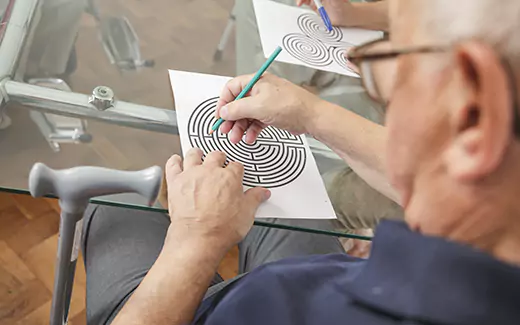
Stages of dementia
As per the World Health Organization, dementia can be categorized into three stages: early, middle, and late. Symptoms corresponding to the different stages are highlighted below.
Early Stage
In its early stages, a person suffering from dementia will still be able to function, almost normally. The symptoms will be barely noticeable:
- Mild forgetfulness
- Feeling lost in familiar spaces
- Experience unexplained time lapses
- Difficulty with complex tasks
The symptoms remain mostly unnoticeable; this period usually lasts for two years.
Middle Stage
As the dementia progresses, it becomes harder to hide the symptoms.
- Short-term memory loss leads to forgetting recent events and repeating actions or questions
- Trouble recognizing familiar environments like home
- Drastic behavior changes
- Changes in sleep patterns
- Increased paranoia, hallucinations, and sometimes delirium
- Will require assistance with personal hygiene and daily activities
This may be the longest period of dementia, lasting between two to four years.
Late Stage
At the last stage, dementia severely impairs the person’s memory and cognitive functions.
- Unaware of their environment and the people around them
- Cannot recognize their loved ones
- Problems with movement
- Behavior issues such as aggression
- Lose any concept of time
By this point, the person will require full-time care for everyday activities. This is possibly the shortest period of dementia lasting between 1 to 2 years.
A dementia diagnosis can be overwhelming for the person, their family, and loved ones. If you know of someone that is suffering from cognitive decline, and exhibits other symptoms of the condition, it is advisable to seek assistance. A diagnosis in its early stages can control the symptoms of the condition making it easier to manage with medications.
Dementia treatment
When dementia is diagnosed in its early stages, the symptoms can be controlled with medication and other management tools. Reversible dementia occurs due to other conditions mimicking dementia symptoms. Behavioral, mood and cognitive functions can be stabilized when the psychiatrist makes a correct diagnosis and provides customized treatment to ease the symptoms.
Irreversible dementia such as Frontotemporal dementia, Alzheimer’s disease, and vascular dementia symptoms can be controlled with medication. However, there is no cure for these forms of the condition.
Therapy, environmental support, and medication are the most commonly prescribed treatment options for a person suffering from dementia.
The goal is to keep the person suffering from dementia safe, and with their symptoms managed with medication. Environmental support and therapy can ease feelings of anger, frustration, or anxiety. Family support is crucial at this stage and caregivers should also seek support through therapy with a counselor and peer groups.


Dementia medications
Dementia medication helps control the symptoms of the condition, although the changes to the brain are irreversible.
There are a few approved medications. A combination of drugs is usually prescribed for the best-suited tailored treatment plan. Each patient varies, and what may work for one patient, may not work for the next.
Your psychiatrist will conduct several evaluations detailing your nutritional and hormone levels; and understand your medical history and symptoms. They will take an integrative approach to your treatment options, offering the best solutions for a balanced life.
Cholinesterase inhibitors (ChEIs)
This medication is used to treat mild to moderate symptoms of dementia. There are three of this class of medication. They are used to treat up to moderate symptoms of Alzheimer’s disease. One of them is prescribed for both Parkinson’s disease and AD.
Cholinesterase inhibitors allow neural connections to communicate and thrive. People suffering from dementia lose brain cells as they die after losing neural connections.
Another third drug used for treatment also affects the brain’s chemical messaging system, but it works on different areas of the brain.
N-methyl-D-aspartate (NMDA) receptor antagonist
One of the drugs licensed for use affects moderate to severe dementia in AD. NMDA and ChEIs both affect different chemical reactions in the brain. Both are known to improve memory in a person suffering from dementia.
Anti-amyloid antibody
This drug works on amyloid proteins that build plaques, causing Alzheimer’s disease. It slows down the progression of the symptoms, although it does not cure it.
Therapy, support, and medication can improve lives by managing symptoms. An early diagnosis can ease the symptoms and help a person lead an improved quality of life.
Reach out for the correct diagnosis and support. Don’t suffer alone.
A dementia diagnosis can often lead to anxiety and depression in a person. Common forms of therapy for dementia are
- Talk therapy with a counselor or group support
- Cognitive Stimulation therapy
- Cognitive Behavioral Therapy
Cognitive Behavior therapy (CBT) is one of the most common forms of talk therapy and is used to treat multiple psychiatric conditions, mostly anxiety and depression. It works by changing a person’s thoughts and behavior patterns to treat their symptoms.
Cognitive stimulation therapy (CST) is a common therapy option for people suffering from mild to moderate dementia or Alzheimer’s disease. It focuses on themed activities that center around continued learning for improved cognitive abilities, emotionally and socially stimulated with group therapy.
Puzzles, games, and other activities with participants and facilitators help them stay focused and improve their memory. If CST is administered on a one-on-one basis, it is then known as iCST; however, CST is usually conducted in group settings as the social aspect of the therapy is crucial for improvement.
Although the benefits of CST in group settings cannot be denied, individual CST can also have a positive impact on a person’s cognitive abilities and emotions. Medication along with therapy is the ideal treatment option.
A psychiatrist will consider a combination of talk therapy, CST, and medications to slow the progress of a person’s cognitive decline. With an early diagnosis, you can ease many symptoms and lead a happy and fulfilling life.
A person can also seek support from many of the Alzheimer’s disease, and other dementia support groups. Speaking with people going through similar challenges in their lives helps many come to terms with their diagnosis, or of their loved ones.
If someone you know is suffering from memory problems, confusion, behavior, or personality changes, then is it advisable for them to seek the necessary support.
Caring for a loved one suffering from dementia is exhausting and often leads to burnout. It is hard to watch the steady decline over the years and can become challenging to balance.
People in the early stages of dementia may not require much assistance to function. The caregiver will possibly support the person in coming to terms with the diagnosis. Many experience anguish and anxiety about their future; working through these emotions with therapy and medications is crucial for emotional and mental well-being.
During the moderate and late stages of dementia, your loved one will require assistance with their daily activities and personal hygiene. Behavioral changes, mood swings, and personality changes will be more prominent. The person may not be able to recognize familiar faces and locations. Medications, therapy, and full-time personal assistance will be crucial for the late stages of the condition.
The chances of getting dementia increases with age, although dementia is not a normal part of aging. As a caregiver, your emotional and mental well-being will be challenged with difficult situations. Delivering the best care requires essential support and therapy.
Caregiving involves many unforeseeable stressors. You may need to provide a caregiver for years. The burnout can leave you feeling resentful and overwhelmed, affecting the quality of care you provide for your loved one. It can also affect your personal relationships, health, academic, and professional performance.
Taking frequent breaks and getting caregiving assistance is important for the best care for your family. If your loved ones are suffering from impaired cognitive abilities and memory issues, then a thorough evaluation and an early diagnosis slow the development of the condition.
Our board-certified psychiatrists are committed to providing optimal, patient-centric care. They develop each treatment based on the level of cognitive impairment, assess for other underlying disorders or conditions, and consider drug interactions.
With dementia, the most crucial aspect is an early diagnosis. It can significantly improve the patient’s symptoms, and also give their families enough time to prepare. An early intervention also extends the period of independence for the patient.
Accepting the difficult diagnosis can be overwhelming. Working through the challenges of the initial symptoms together can help both the patient, as well as the caregiver.
Don’t suffer alone. Get the diagnosis and treatment you or your loved ones require to alleviate the symptoms and manage medication. Reach out for evaluations, therapy, and other treatment options.



